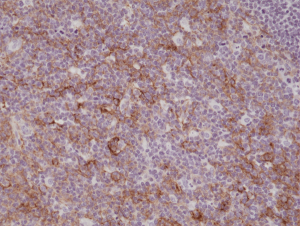anti-CD11b (human) Rabbit Monoclonal (RM290)
| Code | Size | Price |
|---|
| REV-31-1174-00-R100 | 100 ul | £455.00 |
Quantity:
Prices exclude any Taxes / VAT
Overview
Antibody Isotype: Rabbit IgG
Antibody Clonality: Recombinant Antibody
Antibody Clone: RM290
Regulatory Status: RUO
Target Species: Human
Applications:
- Immunohistochemistry (IHC)
- Western Blot (WB)
Shipping:
Blue Ice
Storage:
+4°C
Images
Documents
Further Information
Alternate Names/Synonyms:
Integrin alpha-M
Concentration:
N/A
EClass:
32160000
Form (Short):
liquid
Formulation:
Liquid. 50% Glycerol/PBS with 1% BSA and 0.09% sodium azide.
Handling Advice:
Avoid freeze/thaw cycles.
Immunogen:
A peptide corresponding to the C-terminus of human CD11b (Integrin alpha-M).
Long Description:
Recombinant Antibody. This antibody reacts to human CD11b (Integrin alpha-M). Applications: WB, IHC. Source: Rabbit. Liquid. 50% Glycerol/PBS with 1% BSA and 0.09% sodium azide. Integrins are transmembrane proteins that mediate interactions between adhesion molecules on adjacent cells and/or the extracellular matrix (ECM). Integrins have diverse roles in several biological processes including cell migration during development and wound healing, cell differentiation, and apoptosis. Their activities can also regulate the metastatic and invasive potential of tumor cells. They exist as heterodimers consisting of alpha and beta subunits. Some alpha and beta subunits exhibit specificity for one another and may be designated as a VLA (very late antigen) member. Heterodimers often preferentially bind certain cell adhesion molecules, or constituents of the ECM. Although they have no catalytic activity, integrins can be part of multimolecular signaling complexes known as focal adhesions. CD11b (Integrin alpha-M; ITGAM; Integrin alpha-X; ITGAX) is a 165 kDa adhesion molecule that associates non-covalently with integrin beta-2 (CD18). The CD11b/CD18 heterodimeric complex is also known as integrin alpha-M beta-2, Mac-1, and CR3 (complement receptor 3). CD11b is expressed on the surface of monocytes/macrophages, granulocytes, activated lymphocytes, a subset of NK cells, a subset of dendritic cells and microglia in the brain. CD11b/CD18 functions as the receptor for ICAM-1 (CD54), ICAM-2 (CD102), ICAM-4 (CD242), CD14, CD50, CD23, heparin, iC3b, fibrinogen and Factor X, these adhesions are critical for cell-cell and cell-matrix interactions. CD11b is commonly used as a microglial marker in nervous tissue. The expression of CD11b increases during monocyte maturation and expression levels vary on tissue macrophages. Diseases associated with CD11b dysfunction include systemic lupus erythematosus 6 and ITGAM-related susceptibility to systemic lupus erythematosus.
NCBI, Uniprot Number:
P11215
Package Type:
Vial
Product Description:
Integrins are transmembrane proteins that mediate interactions between adhesion molecules on adjacent cells and/or the extracellular matrix (ECM). Integrins have diverse roles in several biological processes including cell migration during development and wound healing, cell differentiation, and apoptosis. Their activities can also regulate the metastatic and invasive potential of tumor cells. They exist as heterodimers consisting of alpha and beta subunits. Some alpha and beta subunits exhibit specificity for one another and may be designated as a VLA (very late antigen) member. Heterodimers often preferentially bind certain cell adhesion molecules, or constituents of the ECM. Although they have no catalytic activity, integrins can be part of multimolecular signaling complexes known as focal adhesions. CD11b (Integrin alpha-M; ITGAM; Integrin alpha-X; ITGAX) is a 165 kDa adhesion molecule that associates non-covalently with integrin beta-2 (CD18). The CD11b/CD18 heterodimeric complex is also known as integrin alpha-M beta-2, Mac-1, and CR3 (complement receptor 3). CD11b is expressed on the surface of monocytes/macrophages, granulocytes, activated lymphocytes, a subset of NK cells, a subset of dendritic cells and microglia in the brain. CD11b/CD18 functions as the receptor for ICAM-1 (CD54), ICAM-2 (CD102), ICAM-4 (CD242), CD14, CD50, CD23, heparin, iC3b, fibrinogen and Factor X, these adhesions are critical for cell-cell and cell-matrix interactions. CD11b is commonly used as a microglial marker in nervous tissue. The expression of CD11b increases during monocyte maturation and expression levels vary on tissue macrophages. Diseases associated with CD11b dysfunction include systemic lupus erythematosus 6 and ITGAM-related susceptibility to systemic lupus erythematosus.
Purity:
Protein A purified.
Source / Host:
Rabbit
Specificity:
This antibody reacts to human CD11b (Integrin alpha-M).
Transportation:
Non-hazardous
UNSPSC Category:
Primary Antibodies
UNSPSC Number:
12352203
Use & Stability:
Stable for at least 1 year after receipt when stored at -20°C.



